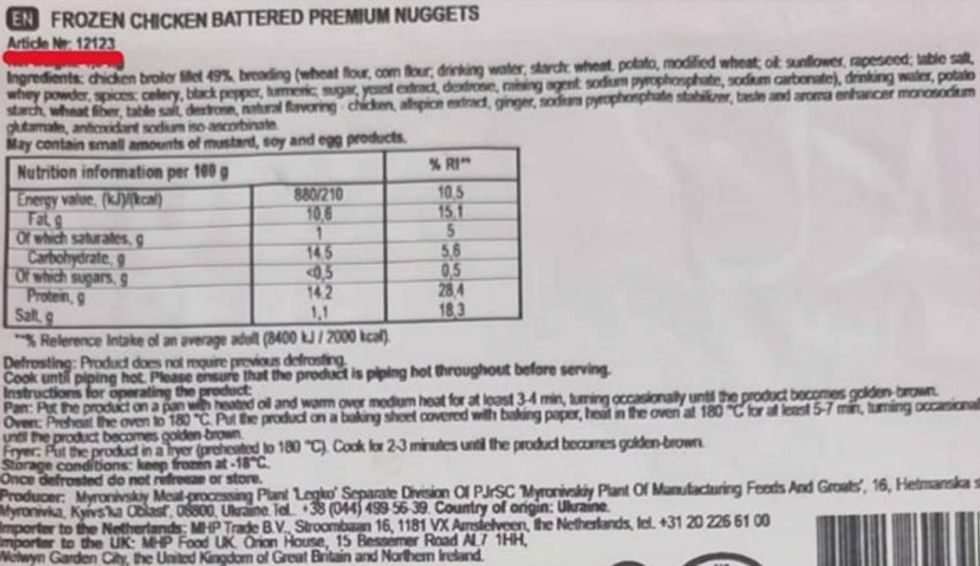Britons warned as supermarket chicken poses health risk - may cause vomiting and abdominal pain

Britons should check their kitchens for the affected item
|GETTY IMAGES

Britons who have a milk allergy or suffer from lactose intolerance should not consume the product
Don't Miss
Most Read
Scottish supermarket chain Farmfoods has recalled Qualiko Frozen Chicken Battered Premium Nuggets because they contain milk, which is not mentioned on the label.
This means the product poses a potential health risk to anyone with an allergy or intolerance to milk or milk constituents.
Qualiko Frozen Chicken Battered Premium Nuggets
Pack size: 1kg
Batch code: 12123 and 12132
Best before: All dates

The batch code is located on the label
|Farmfoods
The Food Standards Agency (FSA) told Britons: "Farmfoods is recalling the above product from customers and has been advised to contact the relevant allergy support organisations, which will tell their members about the recall.
"The company has also issued a point-of-sale notice to its customers. These notices explain to customers why the product is being recalled and tell them what to do if they have bought the product."
Farmfoods' official notice reads: "It has been brought to our attention that Qualiko Frozen Chicken Battered Premium Nuggets 'Article No 12123 and Article No 12132' contain Whey Powder and Milk should have been labelled as an allergen. All other articles are correctly labelled.
"If you have this product and have a milk allergy or suffer from lactose intolerance, please do not consume the product.
"Please return the affected product to the store where the product was purchased for a full refund. No receipt is required.
"We take consumer safety very seriously and sincerely apologise to our loyal customers for this situation and any inconvenience it may have caused."
Affected customers with questions or concerns can contact Farmfoods Customer Service at 0121 700 7160.
The FSA echoed Farmfoods' guidance: "If you have bought the above product and have an allergy or intolerance to milk or milk constituents, do not eat it."
Allergy UK has essential information on cow's milk allergy in both children and adults. In children, there are two types of cow's milk allergy: IgE-mediated food allergy and Non-IgE mediated food allergy.
With an IgE-mediated food allergy, caused by the Immunoglobulin E antibody, symptoms are "immediate" and can occur within minutes. With a Non-IgE mediated food allergy (the most common type of cow's milk allergy) symptoms are 'delayed' (slow to appear), typically developing from two hours after consumption but can take up to 72 hours. It is caused by a different part of the immune system reacting in a different way.
LATEST DEVELOPMENTS:

Symptoms of an IgE-mediated cow's milk allergy include vomiting, nausea and abdominal pain
|GETTY IMAGES
Symptoms of cow's milk allergy in children
Allergy UK said: "Symptoms of CMA often start in the early weeks and months of life. There are many possible symptoms which may suggest your baby has a cow’s milk allergy. Allergic symptoms can affect one or more of the body’s systems, including the skin, digestive and, less commonly, breathing or blood circulation. Common symptoms of cow’s milk allergy include:
- Skin reactions such as hives, eczema, redness, or itching.
- Gastrointestinal issues include vomiting, diarrhoea, abdominal pain, or discomfort.
- Respiratory symptoms include sneezing, runny nose, coughing, wheezing, or shortness of breath.
- General discomfort can display as fussiness, irritability, and refusal to feed.
"Allergic symptoms may be called mild, moderate, or severe. However, it is important to remember that many of the symptoms of delayed allergies, such as eczema, colic, reflux and diarrhoea are common in infants and milk allergy is only one of a number of possible causes.
"In severe cases, cow’s milk allergy can lead to a life-threatening allergic reaction known as anaphylaxis, which requires immediate medical attention."
Symptoms of cow's milk allergy in adults (IgE-mediated)
Allergy UK said: "Signs and symptoms usually occur within minutes of contact with cow’s milk, but can also occur up to one hour later. Most allergic reactions are mild but they can also be moderate or severe. Anaphylaxis is the most severe form of allergic reaction which can be life-threatening.
"Mild to moderate symptoms include an itchy mouth, tongue and throat, swelling of lips, around the eyes or face, red raised itchy rash (often called nettle rash, hives or urticaria), vomiting, nausea, abdominal pain and diarrhoea, and runny nose and sneezing.
"Any one or more of the following symptoms are a sign of a severe allergic reaction (anaphylaxis) and should be treated as a medical emergency. If available, adrenaline should be given without delay and an ambulance called with the call operator informed that it is anaphylaxis.
"Severe symptoms of anaphylaxis include swelling of the tongue and/or throat, difficulty in swallowing or speaking or change in voice (hoarse voice), wheeze (whistling noise) or persistent cough, difficult or noisy breathing, and dizziness, collapse, loss of consciousness (due to a drop in blood pressure)."
In contrast to an allergy, an intolerance reaction does not involve IgE antibodies or the immune system. The most common mechanism for a milk intolerance is due to the milk sugar lactose.
Reactions are usually delayed, occurring hours or days after eating the offending food. The symptoms caused by these reactions are usually gut symptoms, including bloating, diarrhoea, constipation and IBS.










